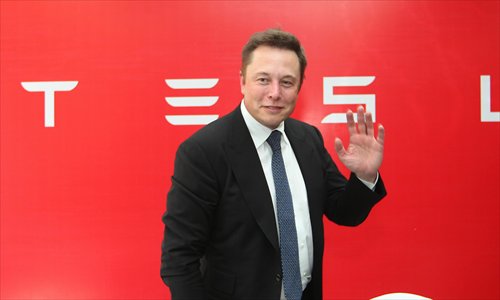Tesla delivers first vehicles in China

Elon Musk at a press conference in Beijing on Tuesday Photo: CFP

US luxury electric car maker Tesla Motors Inc Tuesday delivered the first batch of vehicles to its Chinese customers, marking its official entry into the booming automotive market.
After waiting nearly one year since the preorder, nine senior executives, including Sina's CEO Cao Guowei and Autohome Inc's President Li Xiang, became the first Tesla vehicle owners in China, domestic news portal it.sohu.com reported Tuesday.
During the delivery ceremony held in Beijing, the company's mobile communication provider Cubic Telecom also inked a cooperation agreement with China Unicom, China's second largest telecom carrier by subscribers, to provide Internet service to Chinese Tesla users, said a press release e-mailed to the Global Times Tuesday by China Unicom.
Despite Tesla's strong appeal to elite customers, analysts said the company will very likely face a bumpy road in its venture to China.
The biggest and most important barrier is the lack of a nationwide charging network for Tesla's electric cars, said Feng Shiming, an industry analyst with Shanghai-based Menutor Consulting.
Tesla CEO Elon Musk clearly knows this, but showed his resolve to introduce his cars to China during his first public appearance in the market. He was quoted by the media as saying that the company plans to build solar-powered charging stations in Shanghai and Beijing this year, instead of relying on the national grid.
But Zhang Yu, managing director of Automotive Foresight (Shanghai) Co, holds a bearish view on Musk's plan of powering up on his own.
"If electric car makers want to successfully gain a position in the Chinese market, they must seek support from State Grid Corporation of China as well as local governments. Solar power is not a sustainable solution," Zhang told the Global Times Tuesday.
As of the end of 2013, State Grid Corp has set up 400 charging stations around the country, far lower than the 4,000 it planned to complete by 2015, according to media reports.
State Grid Corp has lowered its projection and seems unwilling to devote full efforts in the construction of charging stations. This is not only because the immature technologies make it difficult to develop a type of charging pile suitable to all batteries, but also because the firm has not seen huge demand for electric cars and electric stations in China, Feng told the Global Times Tuesday.
Electric cars in China are still confronted with a gloomy market reception due to safety concerns and battery life, said Zhang, noting that a Tesla electric car generally takes 30 hours to get charged and batteries are prone to become inflamed during charging.
Three Tesla electric cars reportedly caught fire last year around the world, due to overheated batteries.
The China Association of Automobiles Manufacturers (CAAM) said in January that in 2013 China produced 14,243 electric cars and sold 14,604 units, which analysts said was mainly driven by the central government's subsidy policy for new energy cars.
China's new energy car market is booming and can see an 87.5 percent surge in sales this year to 60,000 units, if including hybrid cars, according to the CAAM.
Both Feng and Zhang remarked that hybrid car have bigger potential than electric cars and are more likely to be accepted by the Chinese people. In 2013, 15,101 hybrid cars were sold in China, higher than the 14,463 produced during the year.
Chinese carmaker BYD Co, which has long been focusing on the development of its pure electric cars, started to step up efforts in hybrids from the beginning of last year.
Feng also noted that only a few people can afford Tesla due to its high price tag, predicting average monthly sales of Tesla in China to be 100 units.
Tesla's S model is priced at 734,000 yuan ($118,000) in China, some $47,000 more than the price in the US.